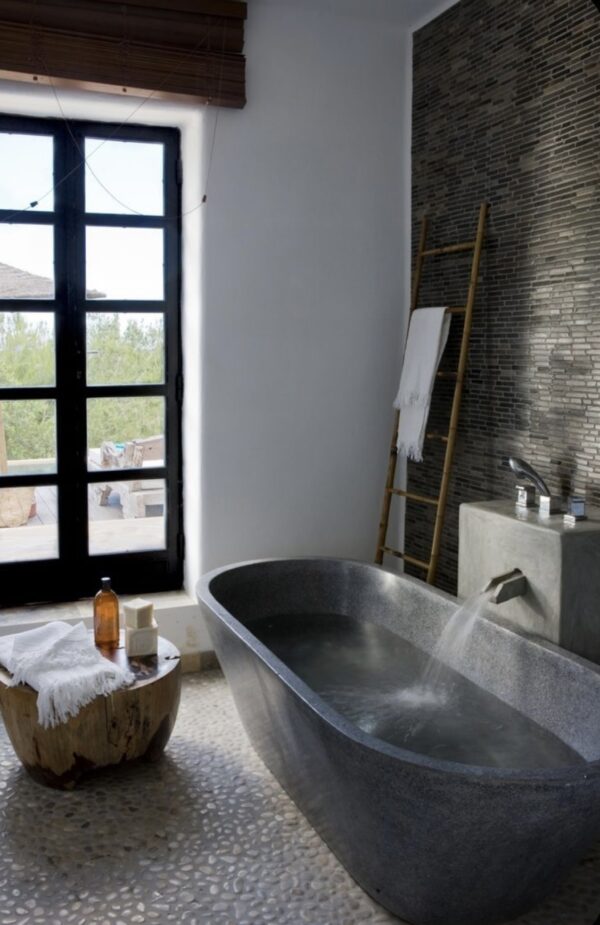Do Stone Baths Retain Heat?
Stone baths are an increasingly popular way to enjoy a luxurious and relaxing bath experience. They are made of natural stone and provide a unique, aesthetically pleasing look to the bathroom. One of the advantages of these baths is that they are known to retain heat better than traditional bathtubs and other bath materials. This makes them ideal for those who want to enjoy a long and comfortable soak without having to constantly add hot water. This article will discuss the various benefits of stone baths and how they can help retain heat for a better bathing experience.
Benefits of Stone Baths
Stone baths have been around for centuries, and good reason. Not only are they aesthetically pleasing, but they also offer a range of benefits that make them a great choice for bathrooms. One of the most important benefits of stone baths is that they retain heat. Stone baths are made from materials such as granite, marble, and limestone, which are all excellent heat conductors. This helps to keep your bathwater warm for longer, so you can enjoy a longer and more luxurious soak. Furthermore, stone baths can take on the temperature of your surroundings; if your bathroom is warm, the stone will help to keep the heat in, while if your bathroom is cold, the stone will help to keep the heat in too. Stone also has natural insulation properties which help to prevent heat loss, so you can enjoy a nice warm bath even on the coldest of days.
Types of Stone Used for Baths
When it comes to creating a luxurious and comfortable bathing experience, the type of stone used can make all the difference. Different types of stone used for baths can vary in heat retention and durability, so it’s important to consider the pros and cons of each option before making a choice.
Granite and marble are two of the most popular stone bath choices, both for their beauty and their ability to retain heat. Granite is known for its durability and heat retention, while marble has a more luxurious look and feel. Quartz stone is another popular option for its stain-resistant properties and long-term durability.
Limestone, soapstone, and slate are also popular options for baths, as each has unique aesthetic and thermal properties. Limestone is known for its subtle hues and unique texture; soapstone is renowned for its heat-retention properties; and slate is highly durable and can be used in a variety of colors and styles.
No matter which type of stone you choose for your bath, you can be confident that it will last for years. With proper maintenance and care, your stone bath can be a luxurious and comfortable addition to your home for years to come.
Factors That Affect Heat Retention
When it comes to the question of whether stone baths retain heat, it’s important to consider the factors that can impact this. Heat retention depends on the type of stone material used, the quality of the stone, and the design of the bathtub.
The material that the bathtub is made from is the most important factor in heat retention. Natural stone is a great choice since it is dense and has many pores that can absorb and retain heat. Additionally, the quality of the stone is important; higher-quality stones will retain more heat than lower-quality stones.
The design of the bathtub also affects heat retention. A bathtub that is round and deep with a smooth surface is likely to retain more heat than a shallow tub with a rough surface. Additionally, the size of the bathtub and the insulating material used will also play a role.
Finally, factors such as the location of the bathtub, the size of the room, and the climate of the area can all impact the amount of heat retained. If the bathtub is located in an area with cold temperatures or high humidity, then it is likely to retain less heat than if it is located in a warm, dry climate.
Overall, the question of whether stone baths retain heat depends on a variety of factors. By considering the type of stone, the quality of the stone, the design of the bathtub, and the environment in which it is located, it is possible to make an informed decision about the heat retention capabilities of stone baths.

Benefits of Heat Retention in Stone Baths
Stone baths are becoming increasingly popular in bathrooms due to their timeless style and ability to retain heat. But what exactly are the benefits of heat retention in stone baths?
Heat retention in stone baths can provide several benefits, from increased energy efficiency to a more comfortable and luxurious bathing experience. Stone is a natural insulator, meaning it retains heat more effectively than other materials. This helps to reduce energy consumption as the bath will stay warm for longer without requiring extra heat to be added.
The heat retention also adds a sense of luxury to the bath. As the water remains warm for longer, it provides a more relaxing and comfortable bathing experience. This is especially beneficial for those with muscle pain or joint pain as the warmth of the water can help to reduce pain and relax muscles.
Finally, the heat retention of stone baths can also help to reduce heat loss and reduce energy costs. The stone helps to keep the heat in the bath which means less energy is required to keep it warm, resulting in lower energy bills.
In conclusion, stone baths are a great choice for those looking to benefit from heat retention. The heat retention of stone helps to improve energy efficiency, create a more comfortable and luxurious bathing experience, and reduce energy costs. So if you’re looking for a timeless style and fantastic heat retention, a stone bath is the perfect choice.
Measuring Heat Retention in Stone Baths
Stone baths are becoming an increasingly popular choice for bathroom renovations due to their durability and natural beauty. But one of the most sought-after features of stone baths is their ability to retain heat. With this in mind, it is important to understand the details of how stone baths compare to other materials when it comes to heat retention.
To begin, stone baths are heavy. This means that they can absorb and retain heat better than lighter materials like ceramic or plastic. Additionally, stone is an excellent insulator, keeping the heat inside the bath for an extended period. This makes stone baths ideal for those seeking a warm and comfortable bathing experience.
While stone baths may retain heat better than other materials, it is important to recognize that the amount of heat that is retained will depend on the type of stone used. For example, a dense stone like granite will retain more heat than a lighter stone such as marble. Additionally, the thickness of the stone can affect its heat retention capabilities.
Overall, stone baths are an excellent choice for those looking for a durable and luxurious bathing experience. With their excellent heat retention capabilities, stone baths offer a cozy and comfortable bathing experience that will last for many years.
Maintenance of Stone Baths
Stone baths remain popular due to their unique design and classic appeal, but their maintenance is essential to ensure they remain in pristine condition. Cleaning stone baths is a simple process, however, it does require some effort to ensure that the bath remains free from the build-up of soap scum and other debris. Regular cleaning helps keep the surface in good condition and ensures that the bath retains its heat. The frequency of cleaning depends on the type of stone bath and the frequency of use.
In addition to regular cleaning, it is important to check the bath for signs of wear and tear. This includes checking for cracks, chips, and other damage that can affect the heat retention of the bath. If any damage is detected, it is important to address the issue as soon as possible to avoid further damage.
For optimal heat retention, it is also important to apply sealant to the stone bath. This helps to protect the stone bath from water and other elements that can degrade the stone and reduce its heat retention. Sealing a stone bath is a straightforward process that can be done at home or by a professional.
Finally, the stone bath must be routinely inspected to ensure that it is in good condition and that its heat retention is not affected. This includes checking the sealant, checking for cracks, and any other signs of damage. If any damage is noticed, it is important to repair the damage to ensure the stone bath continues to retain its heat.
FAQs About the Do Stone Baths Retain Heat?
Q1. Do stone baths retain heat better than other types of baths?
A1. Yes, stone baths are known to retain heat better than other types of baths due to their dense material and insulation properties.
Q2. How long do stone baths stay warm after being filled with hot water?
A2. Stone baths can typically stay warm for up to an hour after being filled with hot water.
Q3. Are stone baths safe to use?
A3. Yes, stone baths are safe to use and are known to be more durable and hygienic than other types of baths.
Conclusion
Overall, stone baths do retain heat better than other materials. Stone baths are capable of lasting much longer without needing to be reheated compared to other materials, such as acrylic or plastic. Additionally, stone baths are known for their durability and are highly resistant to wear and tear. While they may be more costly than other materials, stone baths are worth the investment due to their ability to retain heat and last for years.






